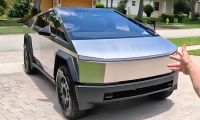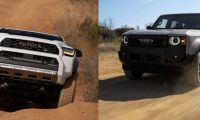At 1,172 miles driven in 24 hours of driving, Better Place has set an unofficial record for the most miles driven by an electric car in 24 hours. The electric modified Holden Commodore, A GM Australian arm of the company was developed by EV Engineering.
The Holden, Commodore got rid of its V-6 and/or V-8 and instead adapted an electric motor and battery pack configuration for the challenge. Better Place, better known for its philosophy that electric cars can go as far as any other vehicles on this planet uses an intelligent idea, that of exchanging the battery pack. The pack used in our case allowed the car and team to drive a 75.8-mile loop before returning to be swapped in a smaller scale version of what Better Place wants to install worldwide.
After reaching 75.8 miles, the team noticed the pack still had 20 to 25% charge left. This means the Better Place battery pack, even in a car not designed for an electric drive could drive an electric car at least 93 miles, if not more.
According to Ian McCleave, CEO of EV Engineering: “It’s a great feeling to see the electric car our team designed and developed here in Australia has beaten a world distance record. While our achievement is not an official record, it’s a sound validation of our car’s capabilities.”
The Better Place Deal. Obviously, this record can only be achieved swapping a battery pack. So far, no battery pack can bring an electric car over 1,000 miles. Australia has been a market Better Place has had its eyes on. Its third market following Israel and Denmark, Better Place installed battery-switching stations, allowing an electric car driver to pull in, drop the depleted battery pack and receive a freshly charged one.
If the idea makes a lot of sense on paper and can be very practical, unfortunately bringing the technology world wide means dealing with big obstacles. The automobile industry is not known to share its technology with the competition easily and has always relied on guarding its savoir-faire in order to have an edge against others. Asking them to use an energy pack system shared between other competitors runs against their regular operations. It’s too bad because it could free them from costly battery system development.
But Better Place also faces another problem that of guaranteeing a battery pack’s “freshness” and quality control. Better Place also has an advantage, it never put all its eggs into one basket and has also worked on developing a recharge infrastructure.
Nonetheless, Better Place offers a great solution if it finds ways to overcome carmakers’ reluctance to share platforms, agree to standards and promise an across the board quality of its swapped battery packs.










